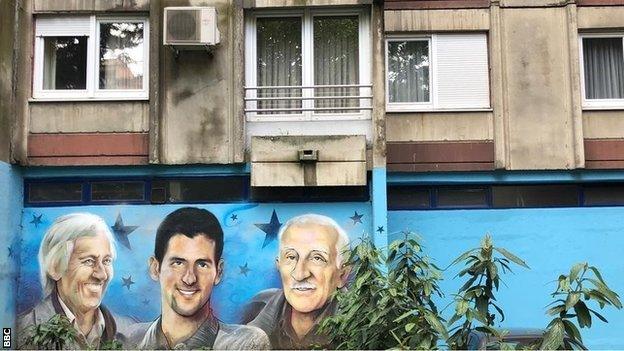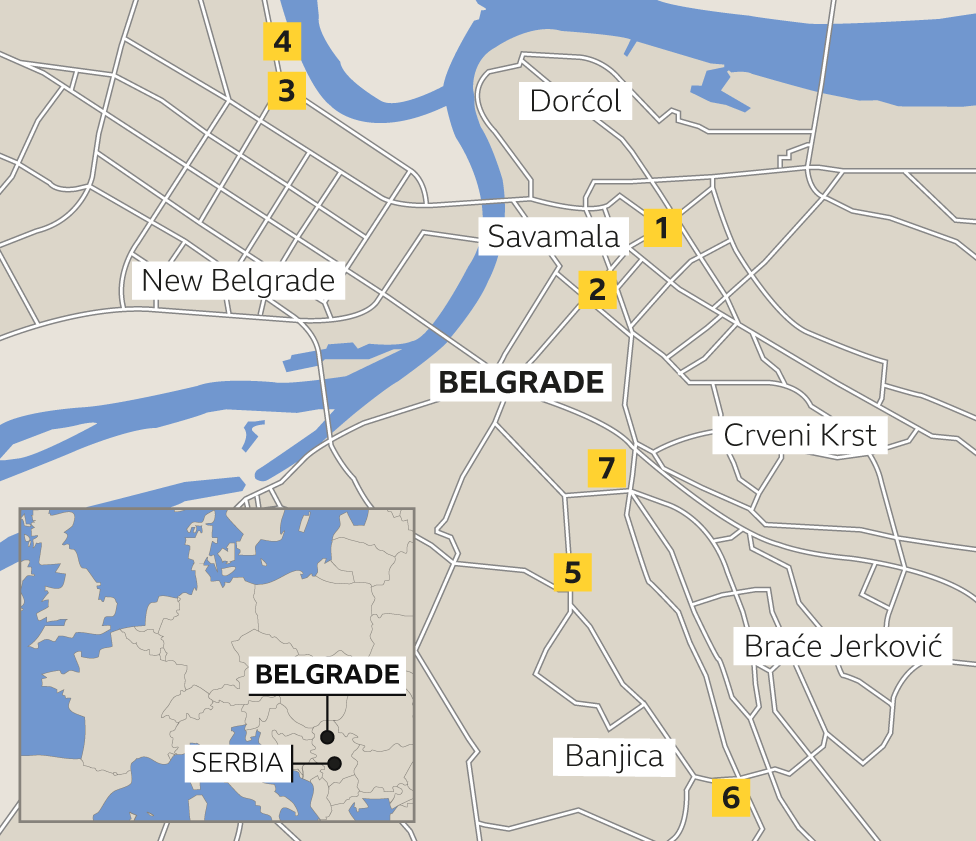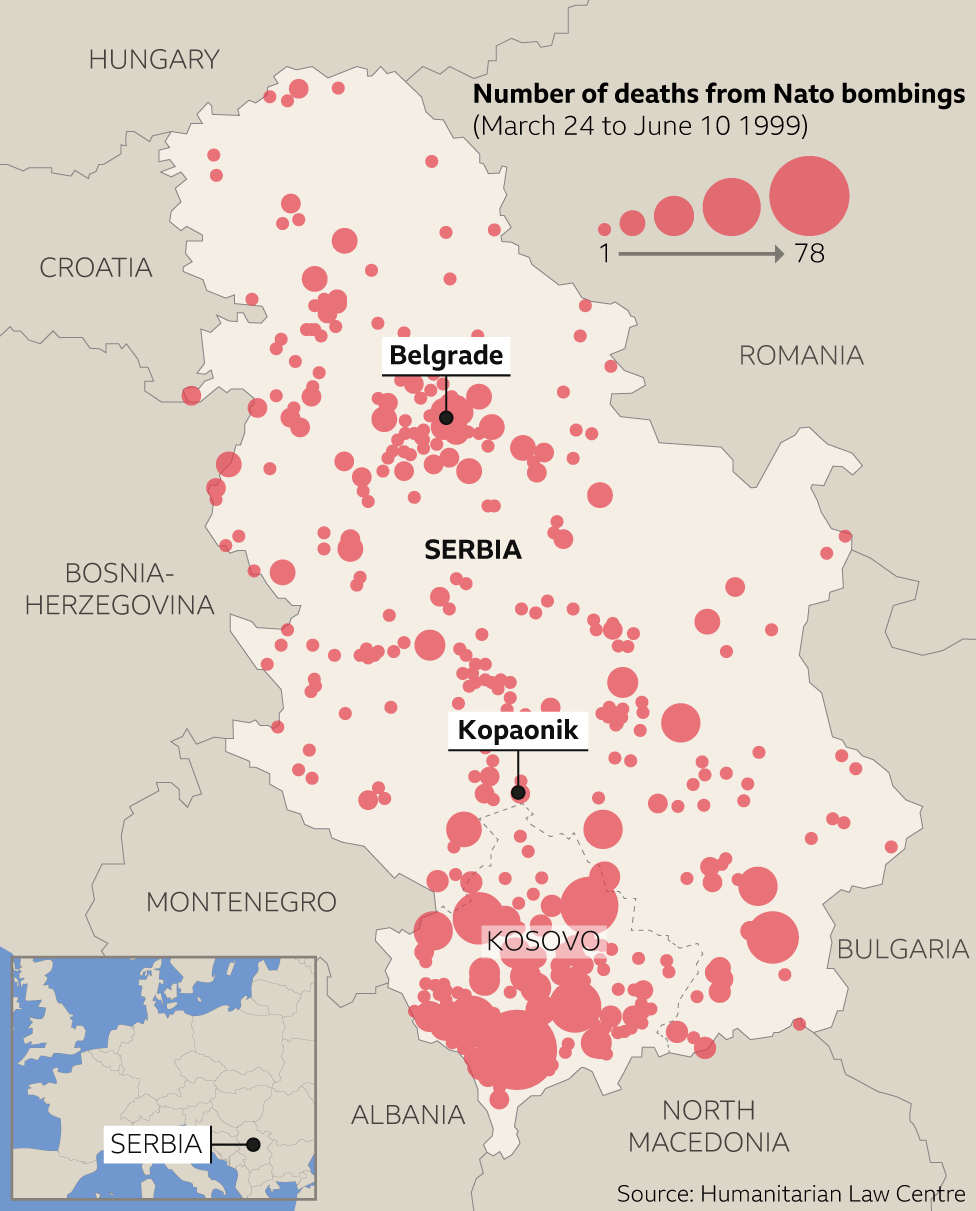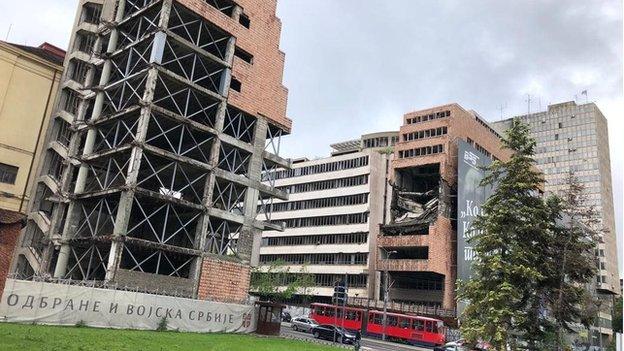Novak Djokovic: How 1999 Nato bombings of Belgrade shaped his career
- Published
- comments

A mural depicts Djokovic outside the flat where he stayed during the bombing of Belgrade in 1999
An original version of this feature was published in May before the French Open
Looking up from the street, this concrete, angular building looks no different from the many Brutalist tower blocks dotted around Belgrade.
As you go inside, a prison-style gate with vertical metal bars guards the white front door of the first flat on the left.
This was the home of Novak Djokovic's grandfather Vladimir.
Here, the world's leading male tennis player sheltered as a small child while Nato bombed the Serbian capital between March and June 1999.
When the head-pounding drone of air-raid sirens rang out, families spanning several generations, along with neighbours and friends from nearby blocks, all filed down the stairs, through several steel doors and into the basement.
This was a formative time for Djokovic, now a 16-time Grand Slam singles champion after winning a fifth Wimbledon title against Roger Federer.
As he celebrated his 12th birthday in May 1999, a decade-long crisis was tearing the Balkans apart and Belgrade was a focal point. Twenty years on, there is still tension over how Nato bombed Serbia, external for 11 weeks in an effort to push Serbian forces out of Kosovo, accusing them of atrocities against ethnic Albanians.
"When they sounded the alarm and the planes started to buzz, you never knew where the bombs would hit," says Djordjo Milenic, an elderly man who was friends with Djokovic's grandfather and lives in the adjacent block.
"They bombed whatever they wanted. 'Collateral damage,' they said. They bombed bridges, hospitals, pregnant women died."
His voice trails off. "It's hard, it's hard."
We are in Banjica, a residential area about 7km south of downtown Belgrade. Locals describe it as "an average suburb", populated by working-class families from a Serbian ethnic background who live in moderately cheap high-rise flats.
Djokovic's grandfather Vlada, as he was known by those close to him, lived in a two-bedroom flat here until his death in 2012.
Now it is unoccupied, owned - according to neighbours, at least - by one of Djokovic's aunts, who they think lives in Switzerland.
Nevertheless, it will always be intrinsically linked to the story of how Djokovic rose from humble beginnings to become one of the greatest tennis players that has ever lived.

Key: 1-5 Bombings which killed civilians. 6 Djokovic's grandfather's flat. 7 Partizan Tennis Club
Djokovic was here with his widowed grandfather because his parents, father Srdjan and mother Dijana, spent most of their time away from Belgrade as they toiled to provide for their three sons - eldest Novak and his two younger brothers Marko and Djordje.
That meant spending most of the year in Kopaonik, a mountain resort near Kosovo, more than four hours' drive from Belgrade.
By day they gave skiing lessons, by night they served pizza in the restaurant they owned. Srdjan and Dijana worked tirelessly to make ends meet while funding Novak's burgeoning tennis career.
Not wishing to disrupt their children's education, the Djokovic boys stayed with granddad Vlada.
"The basement is practically where we stayed. Everyone who could fit here they came, there was no limitation," Novak said in an American TV documentary made by CBS in 2011.
"We were waking up every single night at 2am or 3am for two and a half months because of the bombings," he said of those 78 days in 1999.
"In a way these experiences made me a champion, it made us tougher, made us more hungry for success."
Many people around Banjica know the Djokovic family. Some shared the basement where they sheltered.
Milica Milivojevic is a 31-year-old woman who lives upstairs in Djokovic's old block.
She says there were about "20 or 30" people inside the shelter, remembering it smelt of "moisture and humidity".
"We heard bombs, but not while we were in the shelter," she says.
"From outside we could hear bombs falling on Avala (a hill on the edge of Belgrade targeted because there was a telecommunications tower).
"Friends gathered in the basement, especially younger people. We played some board games - Monopoly or Risk - some older kids were drinking or doing drugs."
She starts laughing: "A lot was going on."
Of course there is no suggestion Djokovic, a child prodigy who had already appeared on national television proclaiming his dream was to win Wimbledon, took part in the 'edgier' adolescent activities.
He was too busy pursuing his dream of becoming world number one.

Bogdan Obradovic has seen a lot in a life which has been dominated by tennis and politics.
A promising junior player who moved into coaching aged 18, Obradovic was approached by Djokovic's father Srdjan to guide his 10-year-old boy.
Later, Obradovic went on to become Serbia's Davis Cup captain - leading them to one of the nation's greatest sporting triumphs when the team containing Djokovic won the trophy in 2010. Now 52, he serves as a member of Serbia's parliament.
"Novak's father and I had some mutual friends and they told him I was a good coach and could maybe help him," he says.
"We did one practice and I was completely shocked.
"He was completely prepared. He was warming up, he had a bottle of water, a banana, a towel, everything. I had never seen that from a kid so young."
Obradovic knew he was a player - at that time "weighing around 25kg" - destined for the top.
During the bombings he says they worked together "every day", going around Belgrade in search of courts they didn't have to pay to use.
"By that time people knew Novak and he was already popular so they helped him a lot. We trained at many different clubs," he says. "It was improvisation but that's how we did it.
"You know Only Fools and Horses? We love it here. And that is actually our mentality. We do everything through fun. And we always think, like Del Boy, our luck will change.
"We were in a terrible situation during the bombings. You hear the sound and see on the news, people were killed and everything is destroyed. But you can do nothing, and we found a way how to make fun.
"I was with Novak all the time, we practised together and every day was like normal. He was focused but having so much fun at that time. He laughed so much."
Djokovic often trained at the Partizan Tennis Club, an arm of the multi-sport body which also includes the 27-time national champion football team, plus successful basketball, water polo and volleyball sides.
Dusan Grujic has been the Partizan president for 22 years and says this is the club Djokovic "has in his heart".
"When you spend 11 years somewhere, like he did here, I don't know how we could say anything different," he adds.
"Novak made his first steps at Kopaonik, but that was only for a short time. When he was six, he came to Partizan. We provided him with everything we could and everything he wanted."
Photos of their greatest son, along with other alumni including 2008 French Open champion Ana Ivanovic, line the walls of a modest clubhouse.
One shows a boyish Novak wearing a Partizan baseball cap and scarf, alongside childhood friend Ivanovic. Djokovic's neighbour Djordjo Milenic says he used to tell grandfather Vlada that Novak "should marry her".
Another shows Djokovic at 16, wearing the club's black and white stripes as he concentrates intently on gearing up a double-handed backhand, a shot he has since honed into one of his most potent.
The clubhouse is being given its annual lick of paint on the day we arrive. Chairs and tables are stacked in the middle of the room while dust sheets cover the windows.
Dragan Gavrilovic - one of the members responsible for maintaining the 75-year-old club - is more than happy to down tools and talk tennis.
Pulling out a cigarette with white emulsion flicked over his fingers, he says: "When Novak was still small, from about 12 to 15, he used to come to play here and people from all over the city came to watch.
"They knew - and we knew - he was destined for big things. Everybody wanted to see him. They wanted to see history being born."
Back in Banjica, behind his old apartment block, a colourful mural shows Djokovic flanked on one side by the patriarchal grandfather he doted on, childhood coach Jelena Gencic on the other.
Locals wander past without blinking an eye. Some may not even realise Djokovic lived there, but not many.
A woman sweeping up leaves and dirt outside the one flat which has a garden stops to speak with us. "Yes, you should write about Novak, you should," she says.
"He's like from heaven. He's not human, yet he is a modest, normal guy."
She has lived here for 40 years. She points to the concrete football pitch behind us, where a few stray dogs are sleeping in the sun.
"That's where he used to play football. When he had time, of course, because he trained so much.
"Then he became famous, but he would still come here as often as he could, if it was for one day or five minutes."
The woman is reluctant to give her name and disappears back into her yard saying she doesn't want to talk any more.
But she returns a few minutes later, clearly unable to stop herself sharing the pride and love she has for Djokovic.
She was one of the many who spent nights down in the basement bomb shelter. Once that subject comes up, she retreats again.
"Let's not talk about that," she says. "It's not nice to talk about what your neighbours did in such a delicate time."
Yet she adds: "When we were there I told the younger ones to run, to leave the country. At that time we thought they will not bomb the civilians. But they did."

Nato - the North Atlantic Treaty Organisation, the world's most powerful regional defence alliance - began its air strikes against Serbia on 24 March 1999.
Accused of ethnic cleansing in Kosovo, Yugoslav leader Slobodan Milosevic's regime was targeted in an attempt to force their troops out and allow international peacekeepers in, after diplomatic efforts failed.
The bombing campaign ended on 10 June 1999, when Yugoslav troops began to withdraw from Kosovo.
Nato said intervention was necessary to "halt the humanitarian catastrophe that was unfolding". But a number of attacks were "unlawful", according to Human Rights Watch, external - an independent organisation which investigates rights abuses across the world.
Wounds still run deep in Serbia, and resentment towards Nato - and the countries which make it up - is prevalent on the streets of Belgrade.
"We are trying to be 'part of Europe'. How come, when we are now part of Europe? How will they accept us, when we are European right now?" Djordjo Milenic, Djokovic's old neighbour, says.
"They bombed us and now they say we are friends. That's all organised by America and Britain."

Bombs hit the Yugoslav Ministry of Defence building in central Belgrade twice in the space of 15 minutes in the early hours of 30 April, 1999. It has still not been rebuilt.
Kosovo especially remains a major topic. A political message outside the Partizan Tennis Club - one of many such slogans daubed around Belgrade - reads: 'Kosovo is a holy Serbian land.'
Many feel the 'Western' media are obsessed with portraying a negative stereotype of the country as aggressive, unfriendly or hostile. That is another recurring topic of conversation in the city. And yet many others would rather move on.
"People think we are bad people," says George Mitic, a 37-year-old taxi driver.
"But they don't come and see for themselves. If you only watch the news you have a completely different view."
He tells a story from the previous night.
"I picked up some Scandinavians from the airport, they had come for business. They said they were scared.
"I said, 'why are you scared?' They replied, 'because you've had war here'."
"I told them we are open and friendly people."

Sasa Ozmo, a journalist for Sport Klub, describes Djokovic as a "national hero" who deeply understands the responsibility he has of promoting the nation's image across the world.
"But not only is he an ambassador outwards to the world, but he is also an ambassador within," he says.
"For example, there is a huge rivalry with Croatia - obviously there was the war and things stay fresh - but Novak is always very public about his support for the Croatian national football team.
"That doesn't sit well with a lot of people here, but he is trying to change perspective. He's really good at that responsibility."
Recently Djokovic finished top of a national newspaper poll which asked young people in Serbia who they looked up to the most.
"He is a huge role model. We've had some really huge athletes who have inspired generations but they haven't inspired people in the same way Novak has done," Ozmo adds.
"For example, we have a basketball player called Vlade Divac who is also a huge global ambassador and played in the NBA during the bombings.
"But Novak's range is much wider - he is a 'catch all' hero in Serbia. The way his personality is he can identify with people.
"Tennis is the country's third sport behind football and basketball - but Novak is the most popular."

